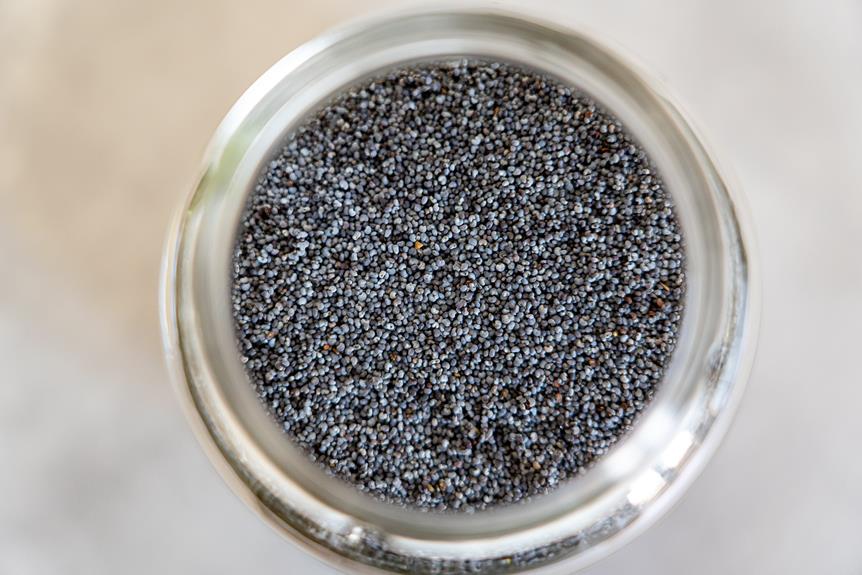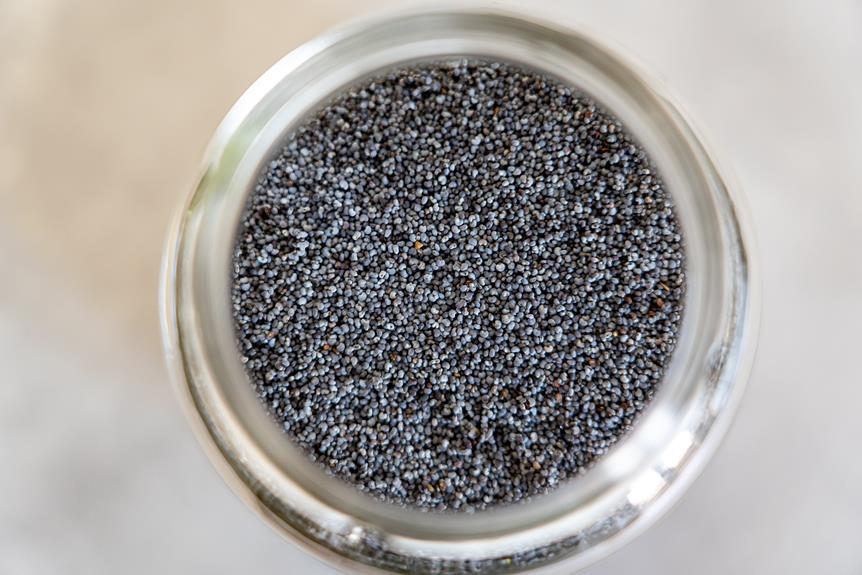So, you think your digestive health could use a little boost, huh? Well, you've come to the right place. We all know that fiber is the key to keeping things moving smoothly, but do you know which high-fiber foods are the most effective? Don't worry, we've got you covered. In this discussion, we'll explore the benefits of high fiber foods and reveal some top-notch options that will have your digestive system thanking you. Trust us, you won't want to miss this.
Key Takeaways
- High fiber foods can prevent constipation, promote regular bowel movements, and reduce the risk of hemorrhoids and diverticulosis.
- Fruits like raspberries, blackberries, apples, pears, and avocados are excellent sources of fiber.
- Nutritious whole grain options like quinoa, brown rice, whole wheat bread, whole wheat pasta, and oats are high in fiber and beneficial for gut health.
- Incorporating high-fiber legumes, beans, and vegetables like broccoli, spinach, and carrots can improve digestion and overall well-being.
Benefits of High Fiber Foods
Eating high fiber foods has numerous benefits for your digestive health. Incorporating these foods into your diet can help prevent constipation and promote regular bowel movements. By adding bulk to your stool, high fiber foods help to move waste through your digestive system more efficiently. This can also reduce the risk of developing hemorrhoids and diverticulosis, which are both related to constipation.
Another benefit of high fiber foods is that they can help maintain a healthy weight. Foods that are high in fiber tend to be more filling, which means you're less likely to overeat. They also take longer to chew and digest, keeping you satisfied for longer periods of time. This can prevent unhealthy snacking and promote weight loss or maintenance.
High fiber foods are also important for maintaining a healthy gut. They act as prebiotics, providing nourishment for the beneficial bacteria in your gut. These bacteria help to break down fiber into short-chain fatty acids, which have numerous health benefits. They can improve the health of your gut lining, enhance nutrient absorption, and boost your immune system.
In addition to these benefits, high fiber foods can also reduce the risk of certain chronic diseases. They have been associated with a lower risk of heart disease, stroke, type 2 diabetes, and certain types of cancer. This is due to their ability to lower cholesterol levels, regulate blood sugar levels, and promote healthy digestion.
Top High-Fiber Fruits
Incorporating high-fiber fruits into your diet is a delicious way to support your digestive health. Fruits are not only packed with essential vitamins and minerals, but they also provide a good amount of dietary fiber, which aids in digestion and promotes regular bowel movements. Including a variety of high-fiber fruits in your daily meals can help you maintain a healthy gut and prevent digestive issues such as constipation.
Here are some top high-fiber fruits that you can easily incorporate into your diet:
| Fruit | Fiber Content (per 1 cup) |
|---|---|
| Raspberries | 8 grams |
| Blackberries | 8 grams |
| Apples | 4 grams |
| Pears | 5 grams |
| Avocado | 10 grams |
Raspberries and blackberries are excellent sources of fiber, with 8 grams per cup. They are also rich in antioxidants, which help protect your cells from damage. Apples and pears, with 4 and 5 grams of fiber per cup respectively, are not only delicious but also provide a good amount of fiber. Avocado, although technically a fruit, is unique in that it is high in healthy fats and fiber, with 10 grams per cup. It can be enjoyed in salads, sandwiches, or even as a spread on whole grain toast.
Nutritious Whole Grain Options
Including a variety of whole grain options in your diet is a nutritious way to support your overall health and digestive system. Whole grains are packed with fiber, vitamins, minerals, and antioxidants that promote optimal digestive health. They are also known to reduce the risk of chronic diseases, such as heart disease, type 2 diabetes, and certain types of cancer. Incorporating whole grains into your daily meals is not only delicious but also beneficial for your overall well-being.
One nutritious whole grain option is quinoa. It is a complete protein source and contains all nine essential amino acids. Quinoa is also rich in fiber, which aids in digestion and helps prevent constipation. Another great choice is brown rice, which retains its bran and germ layers, making it a good source of fiber, vitamins, and minerals. It can also help regulate bowel movements and promote a healthy gut.
Whole wheat bread is another whole grain option that you can easily incorporate into your diet. It is higher in fiber and nutrients compared to refined white bread. Opt for whole wheat pasta as well, as it is a healthier alternative to regular pasta and provides more fiber and nutrients.
Oats are a versatile whole grain that can be enjoyed in various forms, such as oatmeal, granola, or overnight oats. They are high in soluble fiber, which aids in digestion and helps regulate blood sugar levels. Oats are also known to promote the growth of beneficial gut bacteria.
Including these nutritious whole grain options in your diet can provide numerous benefits for your digestive health. They not only support regular bowel movements but also contribute to overall wellness. So, start incorporating these whole grains into your meals and enjoy the positive impact they have on your digestive system.
High-Fiber Legumes and Beans
Legumes and beans are excellent sources of high-fiber nutrients that can support your digestive health. Including these power-packed legumes and beans in your diet can provide numerous benefits to your digestive system. Here are three reasons why you should consider adding more legumes and beans to your meals:
- Increased bowel movement: Legumes and beans are rich in dietary fiber, which adds bulk to your stool and promotes regular bowel movements. This helps prevent constipation and keeps your digestive system functioning smoothly.
- Improved gut health: Legumes and beans contain prebiotic fibers that act as food for the beneficial bacteria in your gut. These fibers help nourish the good bacteria, promoting a healthy gut microbiome. A balanced gut microbiome is essential for optimal digestion and overall well-being.
- Lowered risk of digestive disorders: The high fiber content in legumes and beans has been linked to a reduced risk of digestive disorders, such as diverticulosis, hemorrhoids, and colorectal cancer. The soluble fiber in legumes and beans can also help regulate blood sugar levels, reducing the risk of developing type 2 diabetes.
Incorporating legumes and beans into your diet is easy and versatile. You can enjoy them in various forms, such as lentil soups, chickpea salads, or black bean tacos. Adding legumes and beans to your meals not only enhances the flavor but also provides you with a satisfying and nutritious source of dietary fiber.
Now that you understand the benefits of legumes and beans, let's move on to the next subtopic where we will discuss the role of vegetables in promoting digestive health.
Vegetables for Digestive Health
To support your digestive health, it is important to include a variety of vegetables in your diet. Vegetables are not only rich in essential nutrients but also contain high amounts of fiber, which is crucial for maintaining a healthy digestive system.
One vegetable that is particularly beneficial for digestive health is broccoli. Packed with fiber, broccoli helps promote regular bowel movements and prevents constipation. It also contains a compound called sulforaphane, which has been shown to have anti-inflammatory properties and may protect against certain digestive disorders.
Another vegetable to consider is spinach. This leafy green is not only low in calories but also high in fiber. It aids in digestion by promoting the growth of beneficial gut bacteria and preventing the overgrowth of harmful bacteria. Spinach is also a good source of magnesium, a mineral that helps relax the muscles in the digestive tract and promotes regular bowel movements.
Carrots are another vegetable that can support digestive health. They are rich in fiber, which adds bulk to the stool and helps prevent constipation. Carrots also contain antioxidants and phytochemicals that can help reduce inflammation in the digestive system and protect against digestive disorders.
Lastly, bell peppers are a great addition to your diet for optimal digestive health. They are high in fiber and water content, which can help prevent constipation and promote regular bowel movements. Bell peppers also contain antioxidants that can help reduce inflammation and protect the digestive system.
Incorporating a variety of vegetables into your diet is essential for maintaining a healthy digestive system. Try to include vegetables like broccoli, spinach, carrots, and bell peppers in your meals to support your digestive health and enjoy the numerous benefits they offer.
Frequently Asked Questions
Can High-Fiber Foods Help With Weight Loss?
High-fiber foods can definitely help with weight loss. They keep you feeling fuller for longer and can help control your appetite. Foods like fruits, vegetables, whole grains, and legumes are all high in fiber and can aid in weight management. Incorporating these foods into your diet can help you reduce calorie intake and maintain a healthy weight. So, if you're looking to shed some pounds, adding more high-fiber foods to your meals is a smart choice.
Are There Any Potential Side Effects of Consuming Too Much Fiber?
Are you curious about the potential side effects of consuming too much fiber? It's important to be aware that excessive fiber intake can lead to bloating, gas, and abdominal discomfort. Additionally, consuming an excessive amount of fiber without drinking enough water may result in constipation. Remember to gradually increase your fiber intake and stay hydrated to avoid these potential side effects.
How Much Fiber Should I Be Consuming Daily for Optimal Digestive Health?
To ensure optimal digestive health, you should aim to consume a sufficient amount of fiber every day. The recommended daily intake for adults is around 25 to 30 grams. Fiber helps regulate bowel movements, promotes healthy digestion, and reduces the risk of conditions like constipation and diverticulosis. By incorporating high-fiber foods into your diet, such as fruits, vegetables, whole grains, and legumes, you can support a healthy digestive system and improve overall gut health.
Can High-Fiber Foods Help Prevent or Manage Certain Chronic Diseases?
High-fiber foods can definitely help prevent and manage certain chronic diseases. They play a crucial role in maintaining optimal digestive health by promoting regular bowel movements and preventing constipation. Additionally, a high-fiber diet has been linked to a reduced risk of developing conditions such as heart disease, stroke, and diabetes. By incorporating foods like fruits, vegetables, whole grains, and legumes into your diet, you can reap the benefits of high-fiber foods and support your overall health.
Are There Any Specific High-Fiber Foods That Can Help Alleviate Constipation?
Are you struggling with constipation? Well, there's good news! Certain high-fiber foods can actually help alleviate this uncomfortable condition. Incorporating foods like whole grains, fruits, vegetables, and legumes into your diet can provide the necessary bulk and promote regular bowel movements. Additionally, drinking plenty of water is essential to help soften and move the stool along. So, next time you're feeling backed up, reach for these high-fiber foods and get your digestive system back on track!




